The Perennial Philosophy Class 2
Mike Ervin
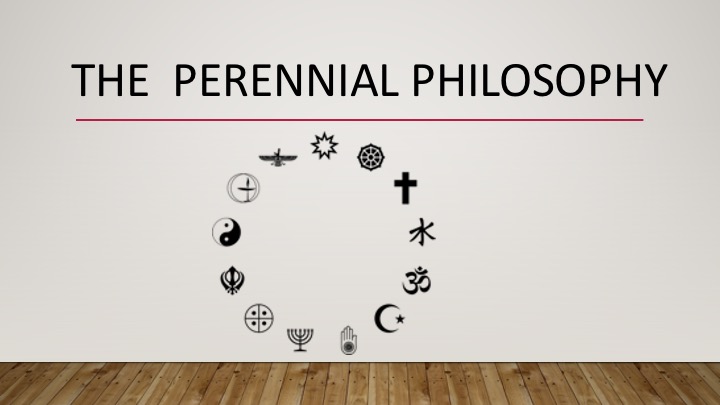
The Perennial Philosophy Class 2
The Perennial Philosophy
And so we return to the Perennial Philosophy! I am sure you are all experts on it now. NOT.
Week 1 was very much a high level and broad introduction to the subject. So it is now time to attempt a deeper dive into what all of this might mean.
So we will be returning to those broad statements attempting to describe what this Perennial Philosophy or Perennial Wisdom really might mean.
And we will be turning this week more and more to the writings of the great mystics to get a feel for how their thinking is congruent with this wisdom, although maybe not always congruent with the theologies of their own religions.
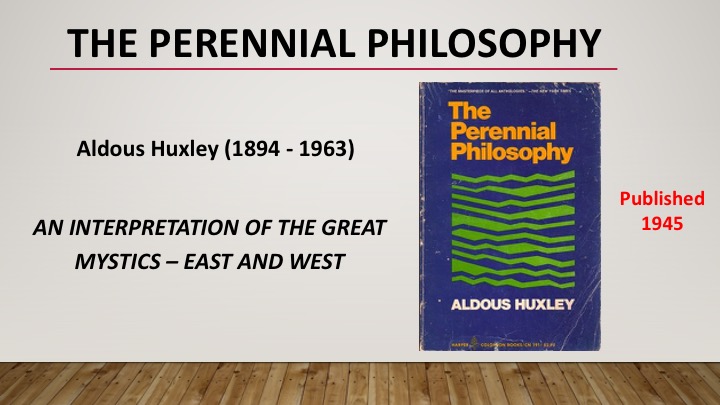
As I mentioned last week, the recent growth in interest in the Perennial Philosophy or Perennial Wisdom has been a result of a 1945 book published by Aldous Huxley. I mentioned that the subtitle - "An interpretation of the Great Mystics - East and West" tells us as much about the content of this book as the title.
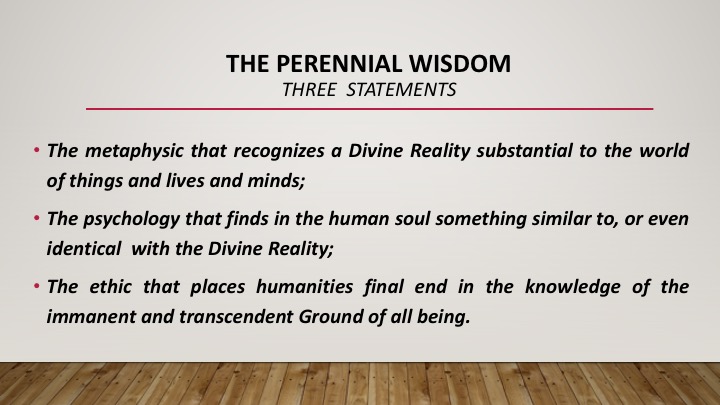
The
Perennial Philosophy
Three
statements
So I would like to begin our deeper dive today by reviewing Huxley’s formulation of the Perennial Philosophy. Huxley was trying to tell us a great deal in as few precise words as he could what this wisdom really entailed.
And I will begin by carefully reading each of his three statements to remind you of what they were. So let’s do that first, and we can then return to each one and examine what he was intending to convey.
The metaphysic that recognizes a Divine Reality substantial to the world of things and lives and minds;
The psychology that finds in the human soul something similar to, or even identical with divine Reality;
The ethic that places man’s final end in the knowledge of the immanent and transcendent Ground of all being.
Huxley was one of the great intellects of the 20th century and wrote over 50 books on a variety of subjects. He can be a hard read because he knows a lot of BIG WORDS. But he chooses them carefully to make his points. so I would like to use his formulation of the Perennial Philosophy because he was in my view trying to teach modern readers some important aspects of the Perennial Philosophy. Let's look at how he did that.
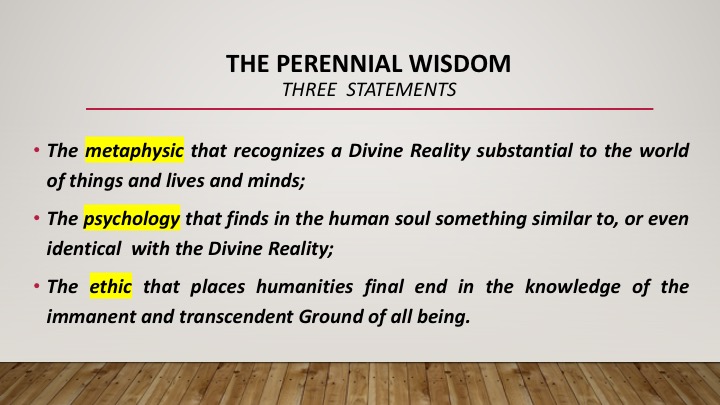
The
Perennial WISDOM
Three
statements
Huxley is trying to convey an important point in the way he formulates this wisdom. That this wisdom is an integration of three different realms of thought. It is not just what we moderns might call religion.
He says that it includes a metaphysic, a psychology, and an ethic. So let’s delve into that first.
Huxley is trying to emphasize that this Perennial Wisdom is actually an integrated combination of a philosophy (metaphysics is a branch of philosophy that we will define shortly), a psychology of humans that defines what it contains and an ethic or practice that helps humans experience an experiential knowledge of the Divine Reality.
Before we define those three aspects a little further let's talk about why modern people of faith perhaps do not understand this tripartite combination as well as those of the past.
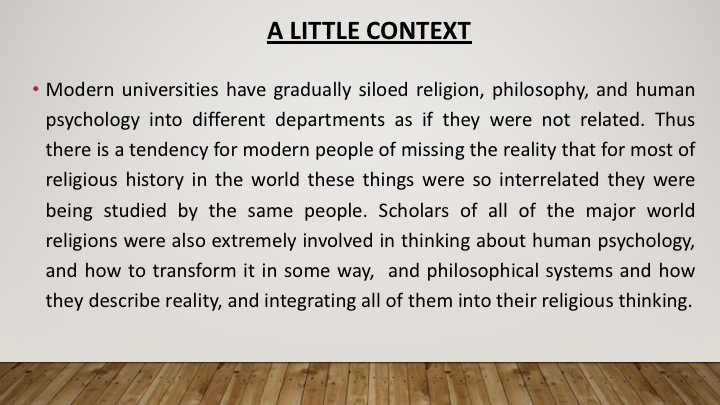
A Little Context
Modern universities in the west have gradually siloed religion, philosophy, and human psychology into different departments as if they were not related. Thus there is a tendency for modern people of missing the reality that for most of religious history in the world these things were so interrelated they were being studied by the same people. Scholars of all of the major world religions were also extremely involved in thinking about human psychology, and how to transform it in some way, and philosophical systems and how they describe reality, and integrating all of them into their religious thinking. All of the important early scholars in Christianity for example were highly educated in Greek philosophy, and it influenced how they interpreted their religion.
As we begin examining the various aspects of what we are going to call The Perennial Philosophy these issues will become clearer because the Perennial Philosophy we are going to be reviewing does involve all of these things – human psychology, philosophy, and it involves religious thinking.
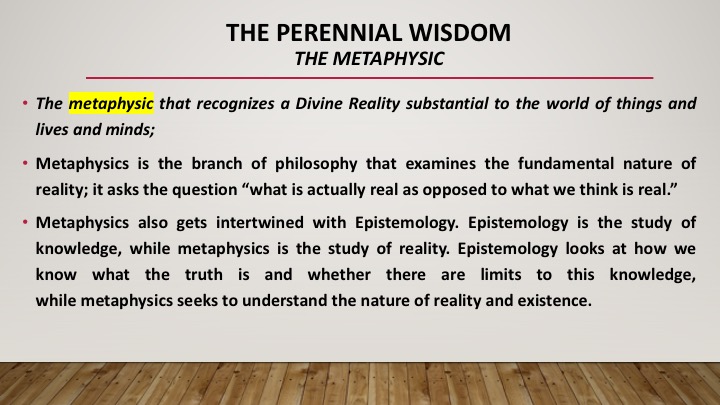
The
Perennial WISDOM
The
Metaphysic
The metaphysic that recognizes a Divine Reality substantial to the world of things and lives and minds;
Metaphysics is the branch of philosophy that examines the fundamental nature of reality; it asks what is actually real as opposed to what we think is real.
It is in metaphysics that that fundamental questions are asked regarding “who or what is the divine reality”? And who or what are we?
Metaphysics also gets intertwined with Epistemology, the study of knowledge, while metaphysics is the study of reality. Epistemology looks at how we know what the truth is and whether there are limits to this knowledge, while metaphysics seeks to understand the nature of reality and existence
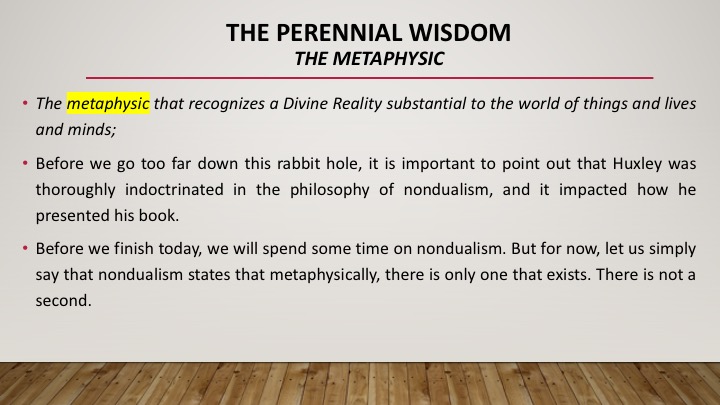
The
Perennial Philosophy
The
Metaphysic
The metaphysic that recognizes a Divine Reality substantial to the world of things and lives and minds;
Before we go too far down this rabbit hole, it is important to point out that Huxley was thoroughly indoctrinated in the philosophy of nondualism, and it impacted how he presented his book.
Before we finish today, we will spend some time on nondualism. But for now, let us simply say that nondualism states that metaphysically, there is only one that exists. There is not a second.
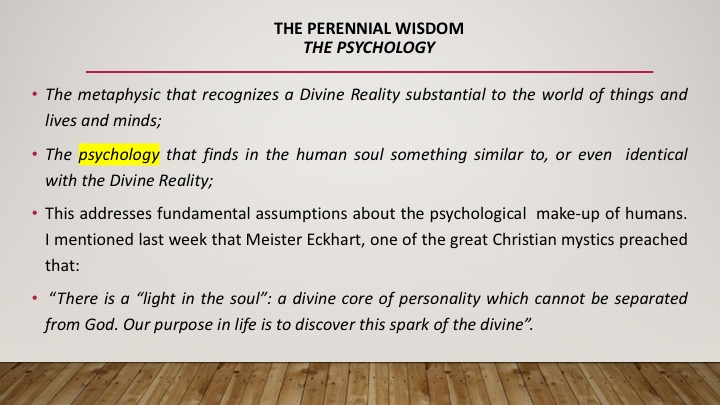
The
Perennial Philosophy
The Psychology
The psychology that finds in the human soul something similar to, or even identical with the Divine Reality;
This aspect addresses fundamental assumptions about the basic interior psychological make-up of humans. I mentioned last week that Meister Eckhart, one of the great Christian mystics preached that:
“There is a “light in the soul”: a divine core of personality which cannot be separated from God. Our purpose in life is to discover this spark of the divine”.
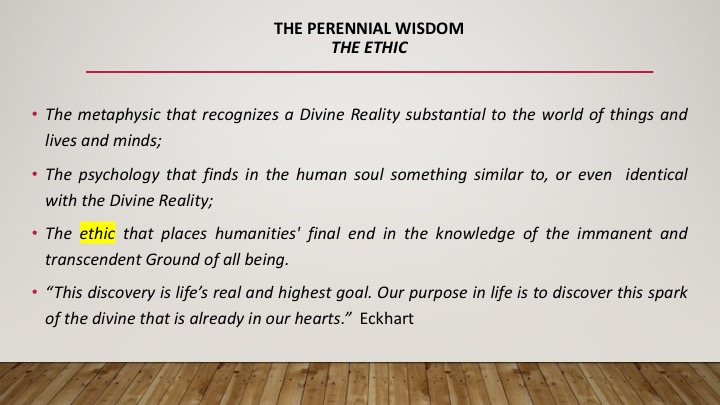
The
Perennial WISDOM
The ETHIC
The ethic that places humanities' final end in the knowledge of the immanent and transcendent Ground of all being.
“This discovery is life’s real and highest goal. Our purpose in life is to discover this spark of the divine that is in our hearts.” Eckhart
“The seed of God is in us. Given an intelligent and hard-working farmer, it will thrive and grow up to God, whose seed it is; and accordingly its fruits will be God-nature. Pear seeds grow into pear trees, nut seeds into nut trees, and God seed into God.” Eckhart
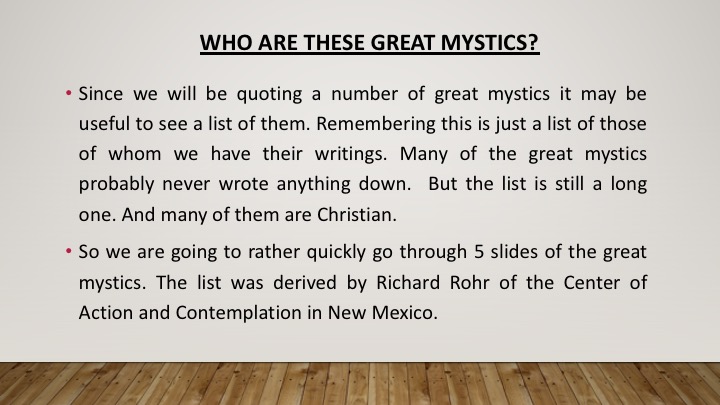
WHO ARE THESE GREAT MYSTICS?
Since we will be quoting a number of great mystics it may be useful to see a list of them. Remembering this is just a list of those of whom we have their writings. Many of the great mystics probably never wrote anything down. But the list is still a long one. And many of them are Christian.
So we are going to rather quickly go through 5 slides of the great mystics. The list was derived by Richard Rohr of the Center of Action and Contemplation in New Mexico. It is a long list, but there will not be a quiz.
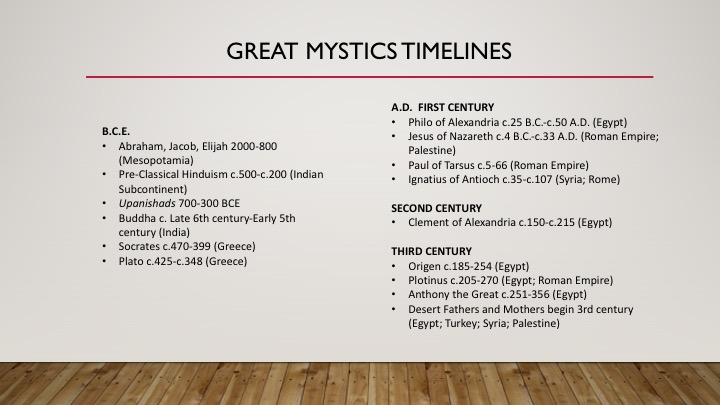
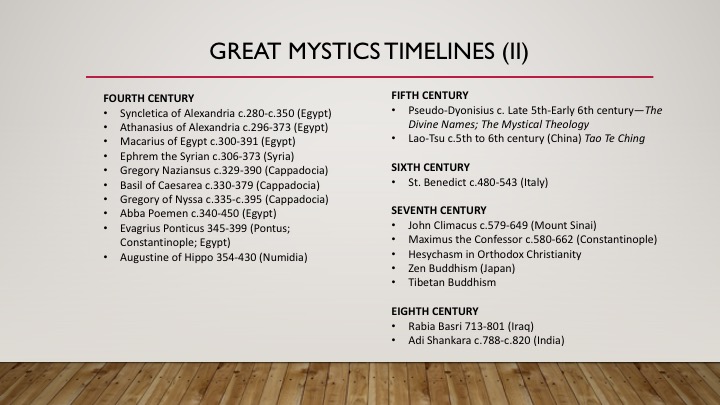
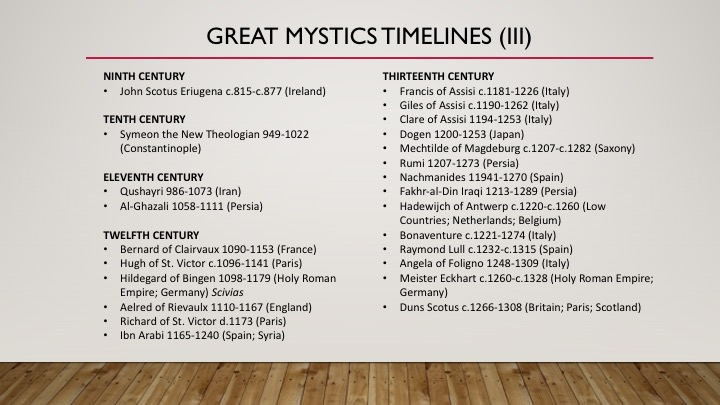
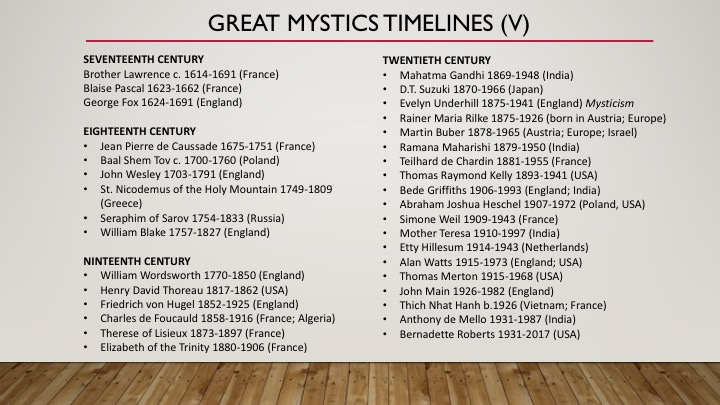

Words of the Mystics
Thomas Merton
“We have the choice of two identities: the external mask which seems to be real...and the hidden, inner person who seems to us to be nothing, but who can give himself eternally to the truth in whom he subsists.
“Everyone of us is shadowed by an illusory person: a false self..We are not very good at recognizing illusions, least of all the ones we cherish about ourselves.
Augustine
“Humans were created in the image of God. True freedom, then, is not found in moving away from that image but only in living it out.”
“Late have I loved you, Beauty so very ancient and so ever new. Late I have loved you! You were within, but I was without.”
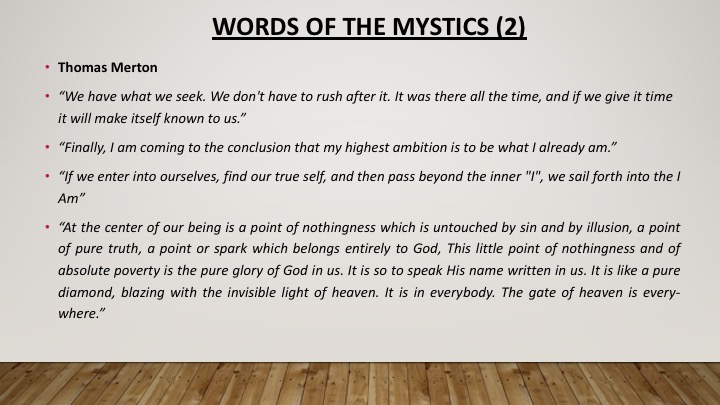
Words of the Mystics
Thomas Merton
“We have what we seek. We don't have to rush after it. It was there all the time, and if we give it time it will make itself known to us.”
“Finally, I am coming to the conclusion that my highest ambition is to be what I already am.”
“If we enter into ourselves, find our true self, and then pass beyond the inner "I", we sail forth into the I Am”
“At the center of our being is a point of nothingness which is untouched by sin and by illusion, a point of pure truth, a point or spark which belongs entirely to God, This little point of nothingness and of absolute poverty is the pure glory of God in us. It is so to speak His name written in us. It is like a pure diamond, blazing with the invisible light of heaven. It is in everybody. The gate of heaven is every- where.”
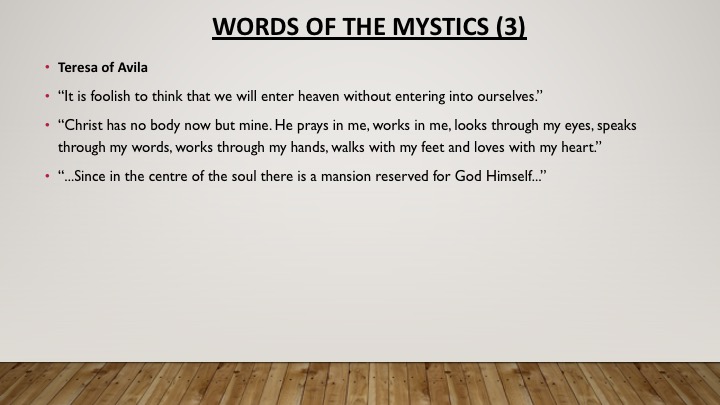
Words of the Mystics
Teresa of Avila
“It is foolish to think that we will enter heaven without entering into ourselves.”
“Christ has no body now but mine. He prays in me, works in me, looks through my eyes, speaks through my words, works through my hands, walks with my feet and loves with my heart.”
“...Since in the centre of the soul there is a mansion reserved for God Himself...”
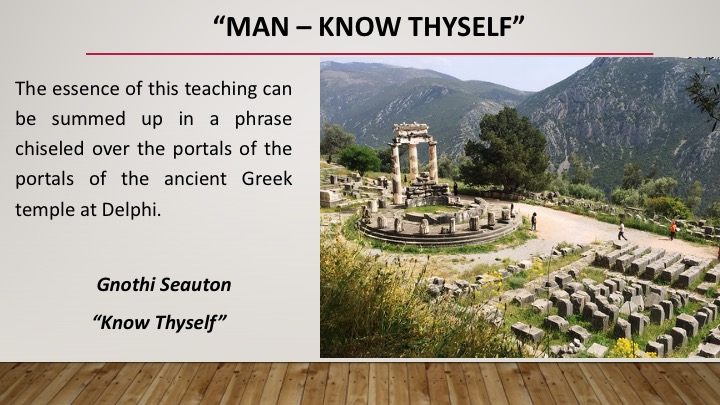
“MAN – KNOW THYSELF”
The essence of this teaching can be summed up in a phrase chiseled over the portals of the portals of the ancient Greek temple at Delphi.
Gnothi Seauton
“Know Thyself”
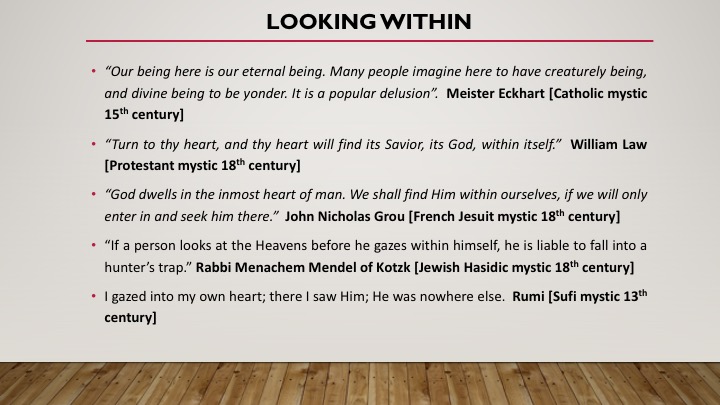
Looking Within
Our being here is our eternal being. Many people imagine here to have creaturely being, and divine being to be yonder. It is a popular delusion. Meister Eckhart [Catholic mystic 15th century]
Turn to thy heart, and thy heart will find its Savior, its God, within itself. William Law [Protestant mystic 18th century]
God dwells in the inmost heart of man. We shall find Him within ourselves, if we will only enter in and seek him there. John Nicholas Grou [French Jesuit mystic 18th century]
If a person looks at the Heavens before he gazes within himself, he is liable to fall into a hunter’s trap. Rabbi Menachem Mendel of Kotzk [Jewish Hasidic mystic 18th century]
I gazed into my own heart; there I saw Him; He was nowhere else. Rumi [Sufi mystic 13th century]
All of these mystics wrote of this sense of a need to turn away from the illusionary things of the world, and to look within themselves.
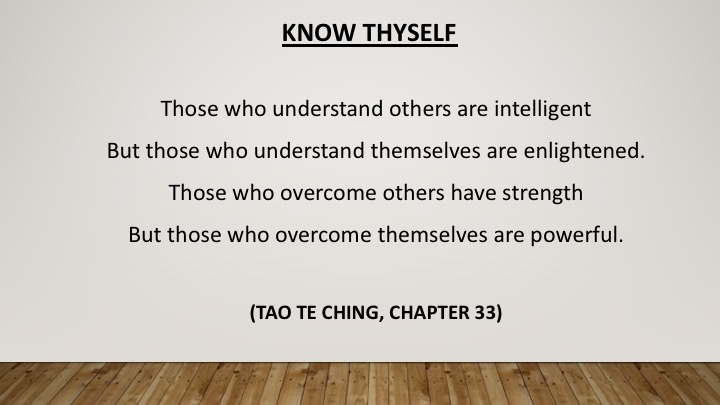
Know Thyself
Those who understand others are intelligent
But those who understand themselves are enlightened.
Those who overcome others have strength
But those who overcome themselves are powerful.
(TAO TE CHING, CHAPTER 33)
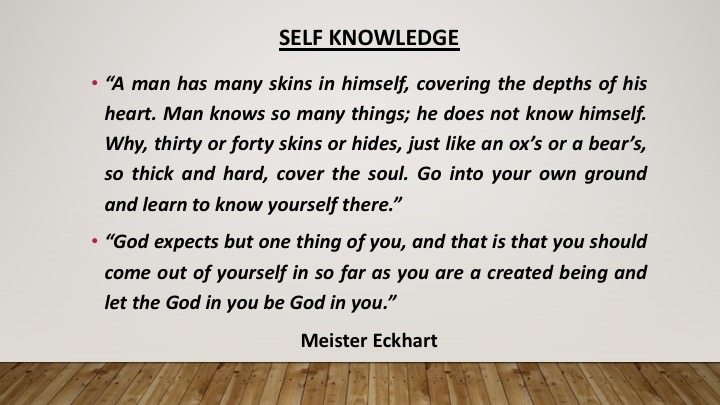
Self Knowledge
“A man has many skins in himself, covering the depths of his heart. Man knows so many things; he does not know himself. Why, thirty or forty skins or hides, just like an ox’s or a bear’s, so thick and hard, cover the soul. Go into your own ground and learn to know yourself there.”
“God expects but one thing of you, and that is that you should come out of yourself in so far as you are a created being and let God be God in you.”
Meister Eckhart
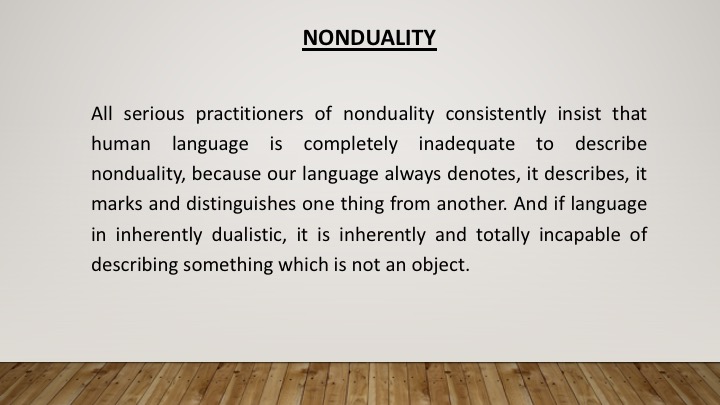
NonDuality
All serious practitioners of nonduality consistently insist that human language is completely inadequate to describe nonduality, because our language always denotes, it describes, it marks and distinguishes one thing from another. And if language in inherently dualistic, it is inherently and totally incapable of describing that which is not an object.
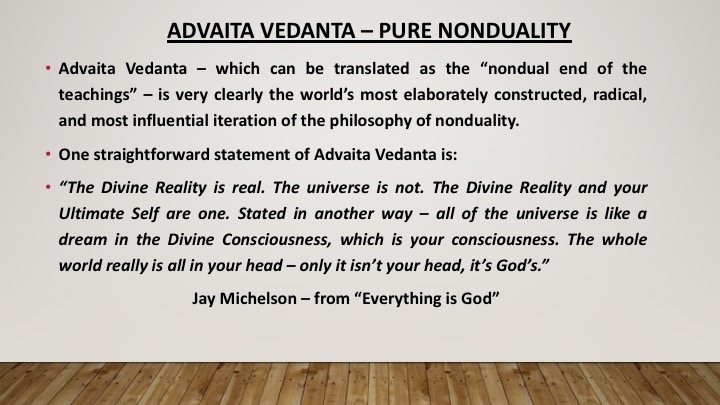
Advaita Vedanta – Pure Nonduality
Advaita Vedanta – which can be translated as the “nondual end of the teachings” – is very clearly the world’s most elaborately constructed, radical, and most influential iteration of the philosophy of non-duality.
One straightforward and radical statement of Advaita Vedanta is:
"The Divine Reality – the absolute existence, knowledge, and bliss – is real. The universe is not real. The Divine Reality and your Ultimate Self are one. Stated in another way – all of the universe is like a dream in the Divine Consciousness, which is your consciousness. The whole world really is all in your head – only it isn’t your head, it’s God’s." Jay Michelson - from "Everything is God"
You may have to read that a few times to realize how radical it is to our dualist minds.
The nondual perspective is one that holds that our common immediate superficial perception of separation – of duality – are not ultimately correct, and that in the true and deepest reality, all of being is one.
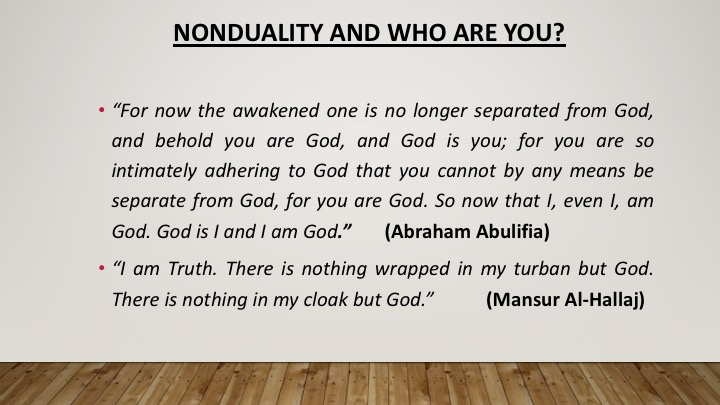
NONDUALITY AND WHO ARE YOU?
“For now the awakened one is no longer separated from God, and behold you are God, and God is you; for you are so intimately adhering to God that you cannot by any means be separate from God, for you are God. So now that I, even I, am God. God is I and I am God.” (Abraham Abulifia). Jewish
“I am Truth. There is nothing wrapped in my turban but God. There is nothing in my cloak but God.” (Mansur Al-Hallaj) Muslim
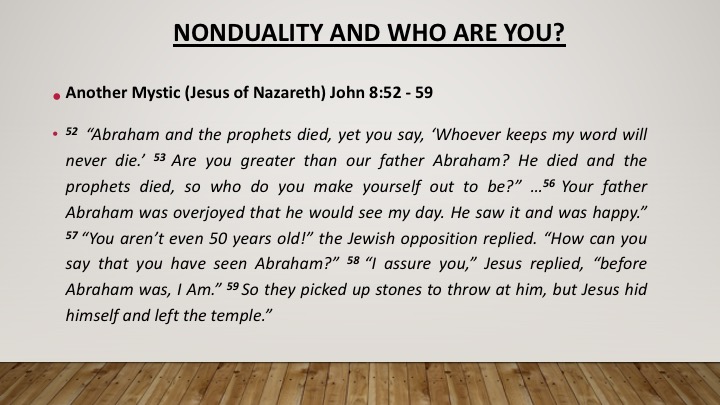
NONDUALITY
AND WHO ARE
YOU?
Another Mystic (Jesus of Nazareth) John 8:52 - 59
His critics asked: 52 “Abraham and the prophets died, yet you say, ‘Whoever keeps my word will never die.’ 53 Are you greater than our father Abraham? He died and the prophets died, so who do you make yourself out to be?” …
Jesus Responded: 56 Your father Abraham was overjoyed that he would see my day. He saw it and was happy.” 57 “You aren’t even 50 years old!” the Jewish opposition replied. “How can you say that you have seen Abraham?”
Jesus Responded: 58 “I assure you,” Jesus replied, “before Abraham was, I Am.” 59 So they picked up stones to throw at him, but Jesus hid himself and left the temple.”
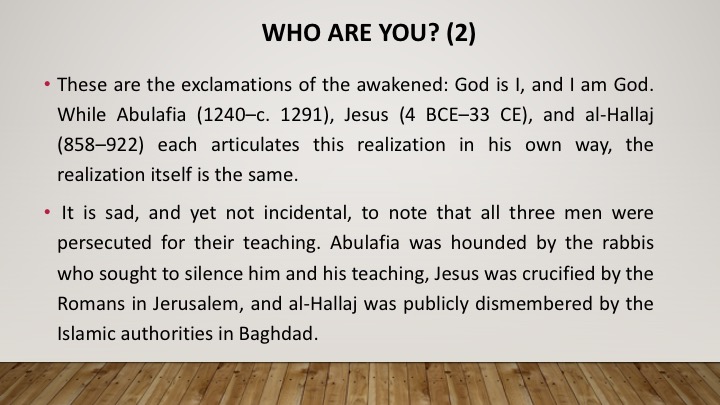
WHO ARE YOU? (2)
All three of these are the exclamations of the awakened: "God is I, and I am God". While Abulafia (1240–c. 1291), Jesus (4 BCE–33 CE), and al-Hallaj (858–922) each articulates this realization in his own way, the realization itself is the same.
It is sad, and yet not incidental, to note that all three men were persecuted for their teaching. Abulafia was hounded by the rabbis who sought to silence him and his teaching, Jesus was crucified by the Romans in Jerusalem, and al-Hallaj was publicly dismembered by the Islamic authorities in Baghdad.
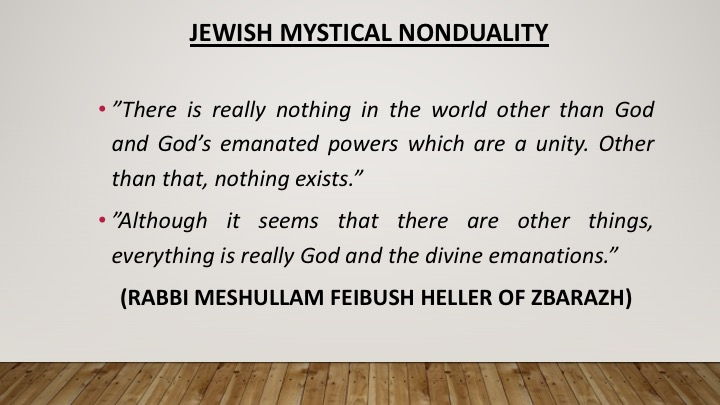
Jewish Mystical Non-Duality
”There is really nothing in the world other than God and God’s emanated powers which are a unity. Other than that, nothing exists.”
”Although it seems that there are other things, everything is really God and the divine emanations.”
(RABBI MESHULLAM FEIBUSH HELLER OF ZBARAZH)
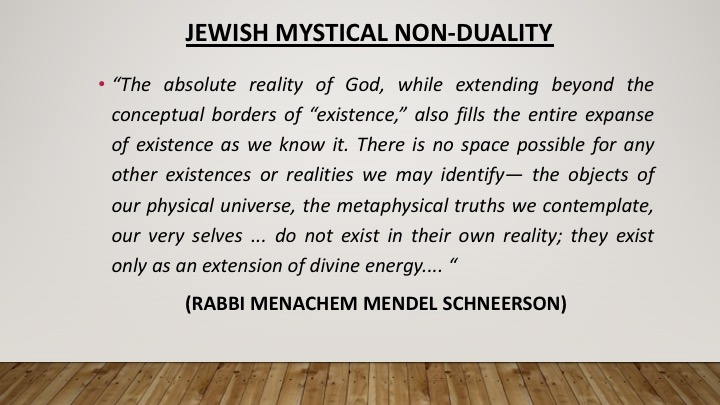
Jewish Mystical Non-Duality
“The absolute reality of God, while extending beyond the conceptual borders of “existence,” also fills the entire expanse of existence as we know it. There is no space possible for any other existences or realities we may identify - the objects of our physical universe, the metaphysical truths we contemplate, our very selves ... do not exist in their own reality; they exist only as an extension of divine energy.... “
(RABBI MENACHEM MENDEL SCHNEERSON)
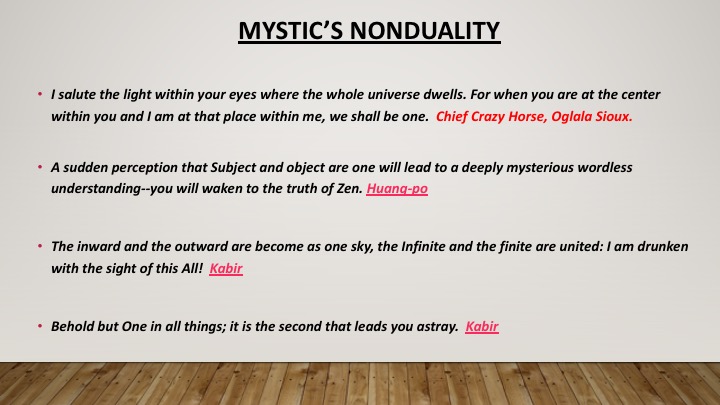
Mystic’s NonDuality
And what about traditions other than the Abrahamic? Let's try American Indians.
• I salute the light within your eyes where
the whole universe dwells. For when you are at the center within you and I am
at that place within me, we shall be one. Chief Crazy Horse, Oglala Sioux.
• A sudden perception that Subject and object are one will lead to a deeply mysterious wordless understanding - you will waken to the truth of Zen. Huang-po
• The inward and the outward are become as one sky, the Infinite and the finite are united: I am drunken with the sight of this All! Kabir (India)
• Behold but One in all things; it is the second that leads you astray. Kabir
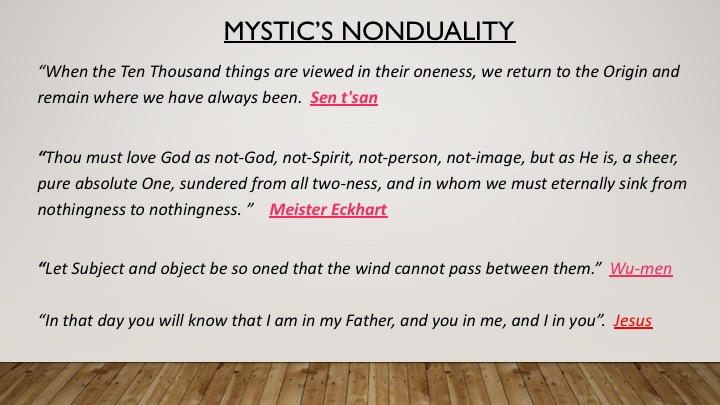
Mystic’s Non-Duality
When the Ten Thousand things are viewed in their oneness, we return to the Origin and remain where we have always been. Sen t’san (a Zen Master in China)
Thou must love God as not-God, not-Spirit, not-person, not-image, but as He is, a sheer, pure absolute One, sundered from all two-ness, and in whom we must eternally sink from nothingness to nothingness. Meister Eckhart (Christian)
Let subject and object be so oned that the wind cannot pass between them. Wu-men (a Zen Master in China)
In that day you will know that I am in my Father, and you in me, and I in you. Jesus of Nazareth
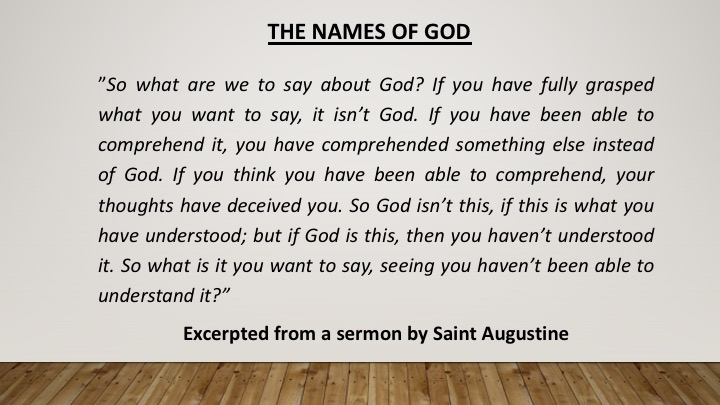
The Names of God
And we find in the mystics an obsession about naming God, because in naming we make God an object. Read this sermon excerpt from Augustine.
”So what are we to say about God? If you have fully grasped what you want to say, it isn’t God. If you have been able to comprehend it, you have comprehended something else instead of God. If you think you have been able to comprehend, your thoughts have deceived you. So God isn’t this, if this is what you have understood; but if God is this, then you haven’t understood it. So what is it you want to say, seeing you haven’t been able to understand it?”
Excerpted from a sermon by Saint Augustine
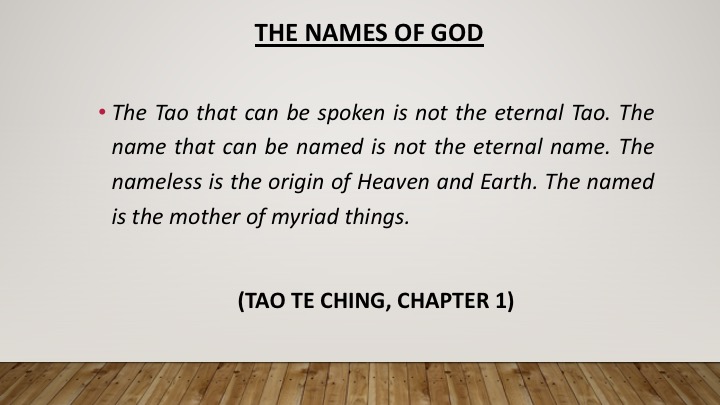
The Names of God
And from the Tao Te Ching (China), in the opening lines of the book.
"The Tao that can be spoken is not the eternal Tao. The name that can be named is not the eternal name. The nameless is the origin of Heaven and Earth. The named is the mother of myriad things."
(TAO TE CHING, CHAPTER 1)
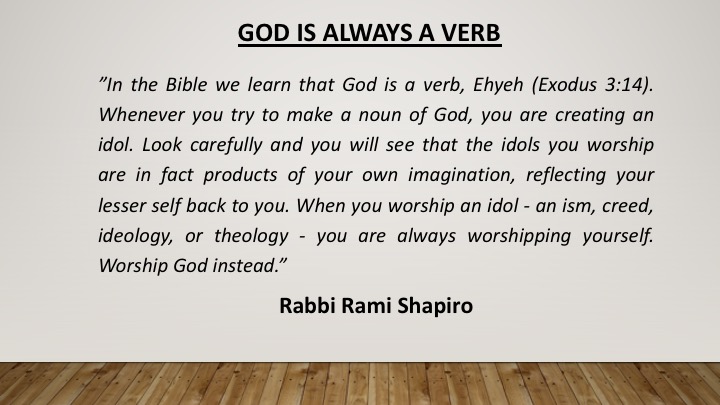
God is Always a Verb
And from one of my favorite Modern Jewish mystics.
”In the Bible we learn that God is a verb, Ehyeh (Exodus 3:14). Whenever you try to make a noun of God, you are creating an idol. Look carefully and you will see that the idols you worship are in fact products of your own imagination, reflecting your lesser self back to you. When you worship an idol - an ism, creed, ideology, or theology - you are always worshipping yourself. Worship God.”
And Shapiro goes on to explain that he is not against creeds or theologies, we need good theology. But it is manmade and should not be worshiped.
Rabbi Rami Shapiro

Perennial Philosophy Class 2
Links
< Home Page> < Perennial Philosophy Menu > < Top of Page >
Perennial Philosophy Class 2 - the Text
The Perennial Philosophy
Three statements
So I would like to begin our deeper dive today by reviewing Huxley’s formulation of the Perennial Philosophy. Huxley was trying to tell us a great deal in as few precise words as he could what this wisdom really entailed.
And I will begin by carefully reading each of his three statements to remind you of what they were. So let’s do that first, and we can then return to each one and examine what he was intending to convey.
The metaphysic that recognizes a Divine Reality substantial to the world of things and lives and minds;
The psychology that finds in the human soul something similar to, or even identical with divine Reality;
The ethic that places man’s final end in the knowledge of the immanent and transcendent Ground of all being.
Huxley was one of the great intellects of the 20th century and wrote over 50 books on a variety of subjects. He can be a hard read because he knows a lot of BIG WORDS. But he chooses them carefully to make his points. so I would like to use his formulation of the Perennial Philosophy because he was in my view trying to teach modern readers some important aspects of the Perennial Philosophy. Let's look at how he did that.
The Perennial WISDOM
Three statements
Huxley is trying to convey an important point in the way he formulates this wisdom. That this wisdom is an integration of three different realms of thought. It is not just what we moderns might call religion.
He says that it includes a metaphysic, a psychology, and an ethic. So let’s delve into that first.
Huxley is trying to emphasize that this Perennial Wisdom is actually an integrated combination of a philosophy (metaphysics is a branch of philosophy that we will define shortly), a psychology of humans that defines what it contains and an ethic or practice that helps humans experience an experiential knowledge of the Divine Reality.
Before we define those three aspects a little further let's talk about why modern people of faith perhaps do not understand this tripartite combination as well as those of the past.
A Little Context
Modern universities in the west have gradually siloed religion, philosophy, and human psychology into different departments as if they were not related. Thus there is a tendency for modern people of missing the reality that for most of religious history in the world these things were so interrelated they were being studied by the same people. Scholars of all of the major world religions were also extremely involved in thinking about human psychology, and how to transform it in some way, and philosophical systems and how they describe reality, and integrating all of them into their religious thinking.
All of the important early scholars in Christianity for example were highly educated in Greek philosophy, and it influenced how they interpreted their religion.
As we begin examining the various aspects of what we are going to call The Perennial Philosophy these issues will become clearer because the Perennial Philosophy we are going to be reviewing does involve all of these things – human psychology, philosophy, and it involves religious thinking.
The Perennial WISDOM
The Metaphysic
The metaphysic that recognizes a Divine Reality substantial to the world of things and lives and minds;
Metaphysics is the branch of philosophy that examines the fundamental nature of reality; it asks what is actually real as opposed to what we think is real.
It is in metaphysics that that fundamental questions are asked regarding “who or what is the divine reality”? And who or what are we?
Metaphysics also gets intertwined with Epistemology, the study of knowledge, while metaphysics is the study of reality. Epistemology looks at how we know what the truth is and whether there are limits to this knowledge, while metaphysics seeks to understand the nature of reality and existence
The Perennial Philosophy
The Metaphysic
The metaphysic that recognizes a Divine Reality substantial to the world of things and lives and minds;
Before we go too far down this rabbit hole, it is important to point out that Huxley was thoroughly indoctrinated in the philosophy of nondualism, and it impacted how he presented his book.
Before we finish today, we will spend some time on nondualism. But for now, let us simply say that nondualism states that metaphysically, there is only one that exists. There is not a second.
The Perennial Philosophy
The Psychology
The psychology that finds in the human soul something similar to, or even identical with the Divine Reality;
This aspect addresses fundamental assumptions about the basic interior psychological make-up of humans. I mentioned last week that Meister Eckhart, one of the great Christian mystics preached that:
“There is a “light in the soul”: a divine core of personality which cannot be separated from God. Our purpose in life is to discover this spark of the divine”.
The Perennial WISDOM
The ETHIC
The ethic that places humanities' final end in the knowledge of the immanent and transcendent Ground of all being.
“This discovery is life’s real and highest goal. Our purpose in life is to discover this spark of the divine that is in our hearts.” Eckhart
“The seed of God is in us. Given an intelligent and hard-working farmer, it will thrive and grow up to God, whose seed it is; and accordingly its fruits will be God-nature. Pear seeds grow into pear trees, nut seeds into nut trees, and God seed into God.” Eckhart
WHO ARE THESE GREAT MYSTICS?
Since we will be quoting a number of great mystics it may be useful to see a list of them. Remembering this is just a list of those of whom we have their writings. Many of the great mystics probably never wrote anything down. But the list is still a long one. And many of them are Christian.
So we are going to rather quickly go through 5 slides of the great mystics. The list was derived by Richard Rohr of the Center of Action and Contemplation in New Mexico. It is a long list, but there will not be a quiz.
Words of the Mystics
Thomas Merton
“We have the choice of two identities: the external mask which seems to be real...and the hidden, inner person who seems to us to be nothing, but who can give himself eternally to the truth in whom he subsists.
“Everyone of us is shadowed by an illusory person: a false self..We are not very good at recognizing illusions, least of all the ones we cherish about ourselves.
Augustine
“Humans were created in the image of God. True freedom, then, is not found in moving away from that image but only in living it out.”
“Late have I loved you, Beauty so very ancient and so ever new. Late I have loved you! You were within, but I was without.”
Words of the Mystics
Thomas Merton
“We have what we seek. We don't have to rush after it. It was there all the time, and if we give it time it will make itself known to us.”
“Finally, I am coming to the conclusion that my highest ambition is to be what I already am.”
“If we enter into ourselves, find our true self, and then pass beyond the inner "I", we sail forth into the I Am”
“At the center of our being is a point of nothingness which is untouched by sin and by illusion, a point of pure truth, a point or spark which belongs entirely to God, This little point of nothingness and of absolute poverty is the pure glory of God in us. It is so to speak His name written in us. It is like a pure diamond, blazing with the invisible light of heaven. It is in everybody. The gate of heaven is every - where.”
Words of the Mystics
Teresa of Avila
“It is foolish to think that we will enter heaven without entering into ourselves.”
“Christ has no body now but mine. He prays in me, works in me, looks through my eyes, speaks through my words, works through my hands, walks with my feet and loves with my heart.”
“...Since in the centre of the soul there is a mansion reserved for God Himself...”
“MAN – KNOW THYSELF”
The essence of this teaching can be summed up in a phrase chiseled over the portals of the portals of the ancient Greek temple at Delphi.
Gnothi Seauton
“Know Thyself”
Looking Within
Our being here is our eternal being. Many people imagine here to have creaturely being, and divine being to be yonder. It is a popular delusion. Meister Eckhart [Catholic mystic 15th century]
Turn to thy heart, and thy heart will find its Savior, its God, within itself. William Law [Protestant mystic 18th century]
God dwells in the inmost heart of man. We shall find Him within ourselves, if we will only enter in and seek him there. John Nicholas Grou [French Jesuit mystic 18th century]
If a person looks at the Heavens before he gazes within himself, he is liable to fall into a hunter’s trap. Rabbi Menachem Mendel of Kotzk [Jewish Hasidic mystic 18th century]
I gazed into my own heart; there I saw Him; He was nowhere else. Rumi [Sufi mystic 13th century]
All of these mystics wrote of this sense of a need to turn away from the illusionary things of the world, and to look within themselves.
Know Thyself
Those who understand others are intelligent
But those who understand themselves are enlightened.
Those who overcome others have strength
But those who overcome themselves are powerful.
(TAO TE CHING, CHAPTER 33)
Self Knowledge
“A man has many skins in himself, covering the depths of his heart. Man knows so many things; he does not know himself. Why, thirty or forty skins or hides, just like an ox’s or a bear’s, so thick and hard, cover the soul. Go into your own ground and learn to know yourself there.”
“God expects but one thing of you, and that is that you should come out of yourself in so far as you are a created being and let God be God in you.”
Meister Eckhart
NonDuality
All serious practitioners of nonduality consistently insist that human language is completely inadequate to describe nonduality, because our language always denotes, it describes, it marks and distinguishes one thing from another. And if language in inherently dualistic, it is inherently and totally incapable of describing that which is not an object.
Advaita Vedanta – Pure Nonduality
Advaita Vedanta – which can be translated as the “nondual end of the teachings” – is very clearly the world’s most elaborately constructed, radical, and most influential iteration of the philosophy of non-duality.
One straightforward and radical statement of Advaita Vedanta is:
"The Divine Reality – the absolute existence, knowledge, and bliss – is real. The universe is not real. The Divine Reality and your Ultimate Self are one. Stated in another way – all of the universe is like a dream in the Divine Consciousness, which is your consciousness. The whole world really is all in your head – only it isn’t your head, it’s God’s." Jay Michelson - from "Everything is God"
You may have to read that a few times to realize how radical it is to our dualist minds.
The nondual perspective is one that holds that our common immediate superficial perception of separation – of duality – are not ultimately correct, and that in the true and deepest reality, all of being is one.
NONDUALITY AND WHO ARE YOU?
“For now the awakened one is no longer separated from God, and behold you are God, and God is you; for you are so intimately adhering to God that you cannot by any means be separate from God, for you are God. So now that I, even I, am God. God is I and I am God.” (Abraham Abulifia). Jewish
“I am Truth. There is nothing wrapped in my turban but God. There is nothing in my cloak but God.” (Mansur Al-Hallaj) Muslim
NONDUALITY AND WHO ARE YOU?
Another Mystic (Jesus of Nazareth) John 8:52 - 59
His critics asked: 52 “Abraham and the prophets died, yet you say, ‘Whoever keeps my word will never die.’ 53 Are you greater than our father Abraham? He died and the prophets died, so who do you make yourself out to be?” …
Jesus Responded: 56 Your father Abraham was overjoyed that he would see my day. He saw it and was happy.” 57 “You aren’t even 50 years old!” the Jewish opposition replied. “How can you say that you have seen Abraham?”
Jesus Responded: 58 “I assure you,” Jesus replied, “before Abraham was, I Am.” 59 So they picked up stones to throw at him, but Jesus hid himself and left the temple.”
WHO ARE YOU? (2)
All three of these are the exclamations of the awakened: "God is I, and I am God". While Abulafia (1240–c. 1291), Jesus (4 BCE–33 CE), and al-Hallaj (858–922) each articulates this realization in his own way, the realization itself is the same.
It is sad, and yet not incidental, to note that all three men were persecuted for their teaching. Abulafia was hounded by the rabbis who sought to silence him and his teaching, Jesus was crucified by the Romans in Jerusalem, and al-Hallaj was publicly dismembered by the Islamic authorities in Baghdad.
Jewish Mystical Non-Duality
”There is really nothing in the world other than God and God’s emanated powers which are a unity. Other than that, nothing exists.”
”Although it seems that there are other things, everything is really God and the divine emanations.”
(RABBI MESHULLAM FEIBUSH HELLER OF ZBARAZH)
Jewish Mystical Non-Duality
“The absolute reality of God, while extending beyond the conceptual borders of “existence,” also fills the entire expanse of existence as we know it. There is no space possible for any other existences or realities we may identify - the objects of our physical universe, the metaphysical truths we contemplate, our very selves ... do not exist in their own reality; they exist only as an extension of divine energy.... “
(RABBI MENACHEM MENDEL SCHNEERSON)
Mystic’s NonDuality
And what about traditions other than the Abrahamic? Let's try American Indians.
• I salute the light within your eyes where the whole universe dwells. For when you are at the center within you and I am at that place within me, we shall be one. Chief Crazy Horse, Oglala Sioux.
• A sudden perception that Subject and object are one will lead to a deeply mysterious wordless understanding - you will waken to the truth of Zen. Huang-po
• The inward and the outward are become as one sky, the Infinite and the finite are united: I am drunken with the sight of this All! Kabir (India)
• Behold but One in all things; it is the second that leads you astray. Kabir
Mystic’s Non-Duality
When the Ten Thousand things are viewed in their oneness, we return to the Origin and remain where we have always been. Sen t’san (a Zen Master in China)
Thou must love God as not-God, not-Spirit, not-person, not-image, but as He is, a sheer, pure absolute One, sundered from all two-ness, and in whom we must eternally sink from nothingness to nothingness. Meister Eckhart (Christian)
Let subject and object be so oned that the wind cannot pass between them. Wu-men (a Zen Master in China)
In that day you will know that I am in my Father, and you in me, and I in you. Jesus of Nazareth
The Names of God
And we find in the mystics an obsession about naming God, because in naming we make God an object. Read this sermon excerpt from Augustine.
”So what are we to say about God? If you have fully grasped what you want to say, it isn’t God. If you have been able to comprehend it, you have comprehended something else instead of God. If you think you have been able to comprehend, your thoughts have deceived you. So God isn’t this, if this is what you have understood; but if God is this, then you haven’t understood it. So what is it you want to say, seeing you haven’t been able to understand it?”
Excerpted from a sermon by Saint Augustine
The Names of God
And from the Tao Te Ching (China), in the opening lines of the book.
"The Tao that can be spoken is not the eternal Tao. The name that can be named is not the eternal name. The nameless is the origin of Heaven and Earth. The named is the mother of myriad things."
(TAO TE CHING, CHAPTER 1)
God is Always a Verb
And from one of my favorite Modern Jewish mystics.
”In the Bible we learn that God is a verb, Ehyeh (Exodus 3:14). Whenever you try to make a noun of God, you are creating an idol. Look carefully and you will see that the idols you worship are in fact products of your own imagination, reflecting your lesser self back to you. When you worship an idol - an ism, creed, ideology, or theology - you are always worshipping yourself. Worship God.”
And Shapiro goes on to explain that he is not against creeds or theologies, we need good theology. But it is manmade and should not be worshiped.
Rabbi Rami Shapiro
Questions?